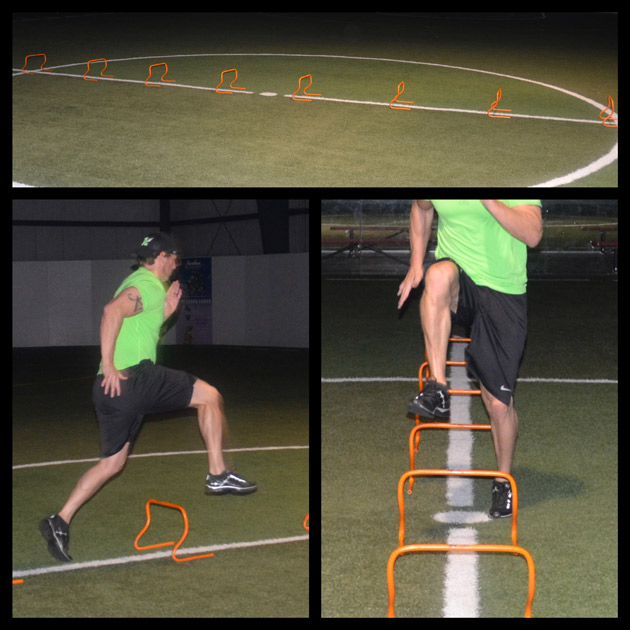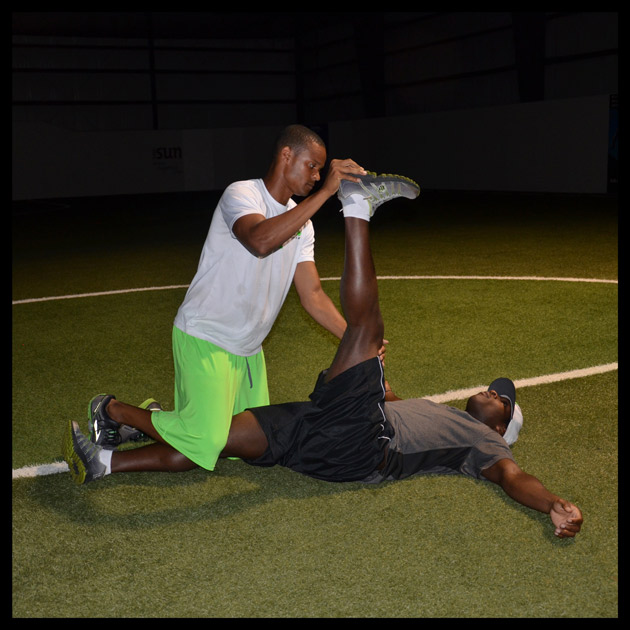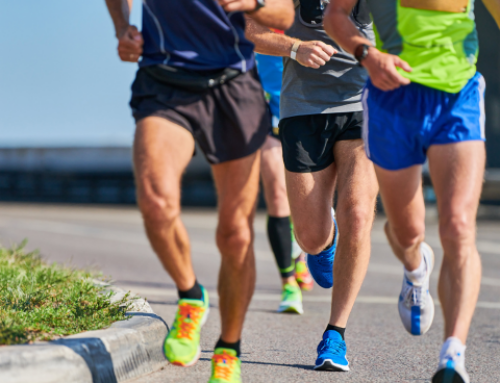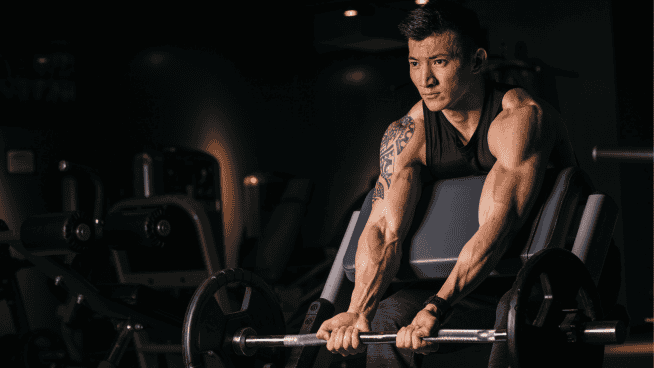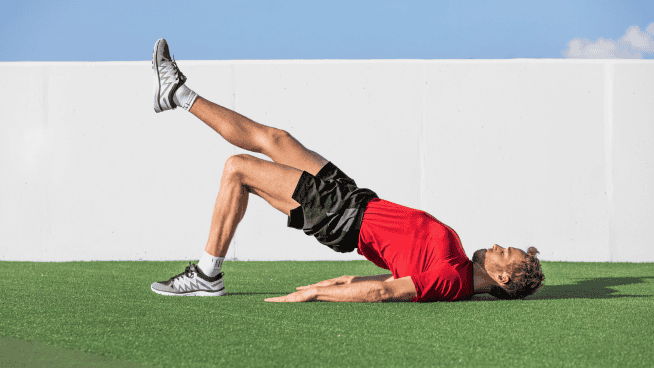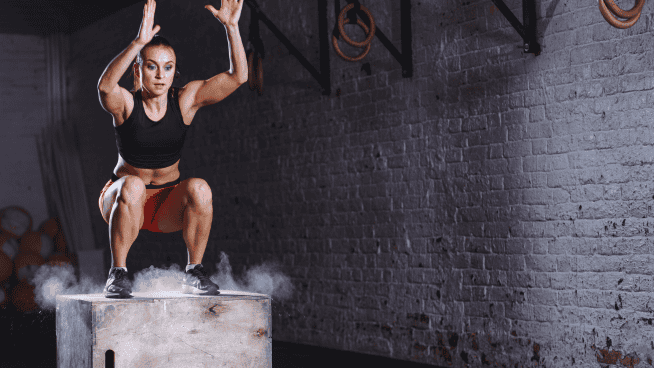4 Keys to Building Football Speed
Speed is the ultimate measurable in football. At the NFL Combine, one tenth of a second in the 40-Yard Dash can determine whether a player gets drafted and makes millions of dollars or has to fight for a spot on a team. (Learn how to perfect your 40 technique.)
I had the opportunity to play six years in the pros, mainly because of my speed. In this article, I have detailed the four speed training components that I focused on during my career and that I now teach at Acceleration Sports Performance.
Before embarking on a speed-training program, remember that you must train with max effort if you want to increase your speed. Have complete focus and never sacrifice form to finish an exercise. Also, make sure to recover between sets for three to five times longer than your work time to ensure that you can continue performing at max speed and explosiveness.
Efficient Running Mechanics
Efficiency is key when it comes to being fast. If you have wasted movements, like swaying side to side, you are wasting power and energy that should be used to propel you forward. So, when doing sprints, remember these seven tips:
- Stay on the balls of your feet
- Swing your arms from eye to hip and never across your body
- Always keep your elbows bent at 90 to 110 degrees
- Keep your chest up
- Keep your lower abs tight
- Drive your knees up 75 to 90 degrees
- Fully extend your back leg on every pushoff
Check out STACK’s Sprinting Technique Guide.
Perform Flying Hurdles
Set up eight mini-hurdles on a field, line-spaced 1.5 yards apart. Take a running start and hit full speed before the first hurdle. Run through the hurdles using the seven tips above and do not touch the lines with your feet.
Sets/Reps: 8xdrill with 1-2 minutes rest
Strong Hip Flexors
I’m sure that you have heard a coach say, “Pick your knees up when you run!” Coaches say that because a proper knee drive helps with the forward swing of the leg during sprinting. The hip flexors are the key component in that knee drive.
Perform Partner Resisted Hips
Lie on your back and have a partner place his hand on your right knee. Drive your knee to your chest without lifting your back or opposite leg off the ground. Have partner resist your movement both up and down for two seconds each. Repeat with opposite leg
Sets/Rep: 3×12 each leg with 1-2 minutes rest
A Strong Posterior Chain
The posterior chain comprises the lower back, glutes, and hamstrings. These muscles fire in coordinated fashion to propel you forward during sprinting. A strong posterior chain allows you to generate more power in the push-off and pull-through phases of the sprint, helping increase acceleration and top speed.
Perform Physioball Hamstring Curls
Lie on your back with your feet on a physioball. Lift your hips so your body is in a straight line. Bend your knees to curl the physioball to your glutes; keep your hips straight. Extend your legs to roll the physioball back to starting position. Perform each rep in control and pause between each movement.
Sets/Reps: 3×20 with 1-2 minutes rest
(Learn other ways to build a stronger posterior chain.)
Flexible Hips and Hamstrings
Do not overlook the little things when trying to get faster. Overly tight hips and hamstrings will hinder your speed, especially when it comes to your stride length. It’s critical to prepare your muscles with a dynamic warm-up and to finish the workout with a quality static stretch.
Perform Partner Hamstring Stretch
Lie down on the ground or a stretch table. Partner places his right hand on your right foot, left hand slightly below your right knee, and right leg on your left knee, pinning it to the floor. Partner stretches your hamstring by pushing your leg forward; hold for specified time. Repeat with opposite leg.
Sets/Duration: 2×20 seconds each leg
RECOMMENDED FOR YOU
MOST POPULAR
4 Keys to Building Football Speed
Speed is the ultimate measurable in football. At the NFL Combine, one tenth of a second in the 40-Yard Dash can determine whether a player gets drafted and makes millions of dollars or has to fight for a spot on a team. (Learn how to perfect your 40 technique.)
I had the opportunity to play six years in the pros, mainly because of my speed. In this article, I have detailed the four speed training components that I focused on during my career and that I now teach at Acceleration Sports Performance.
Before embarking on a speed-training program, remember that you must train with max effort if you want to increase your speed. Have complete focus and never sacrifice form to finish an exercise. Also, make sure to recover between sets for three to five times longer than your work time to ensure that you can continue performing at max speed and explosiveness.
Efficient Running Mechanics
Efficiency is key when it comes to being fast. If you have wasted movements, like swaying side to side, you are wasting power and energy that should be used to propel you forward. So, when doing sprints, remember these seven tips:
- Stay on the balls of your feet
- Swing your arms from eye to hip and never across your body
- Always keep your elbows bent at 90 to 110 degrees
- Keep your chest up
- Keep your lower abs tight
- Drive your knees up 75 to 90 degrees
- Fully extend your back leg on every pushoff
Check out STACK’s Sprinting Technique Guide.
Perform Flying Hurdles
Set up eight mini-hurdles on a field, line-spaced 1.5 yards apart. Take a running start and hit full speed before the first hurdle. Run through the hurdles using the seven tips above and do not touch the lines with your feet.
Sets/Reps: 8xdrill with 1-2 minutes rest
Strong Hip Flexors
I’m sure that you have heard a coach say, “Pick your knees up when you run!” Coaches say that because a proper knee drive helps with the forward swing of the leg during sprinting. The hip flexors are the key component in that knee drive.
Perform Partner Resisted Hips
Lie on your back and have a partner place his hand on your right knee. Drive your knee to your chest without lifting your back or opposite leg off the ground. Have partner resist your movement both up and down for two seconds each. Repeat with opposite leg
Sets/Rep: 3×12 each leg with 1-2 minutes rest
A Strong Posterior Chain
The posterior chain comprises the lower back, glutes, and hamstrings. These muscles fire in coordinated fashion to propel you forward during sprinting. A strong posterior chain allows you to generate more power in the push-off and pull-through phases of the sprint, helping increase acceleration and top speed.
Perform Physioball Hamstring Curls
Lie on your back with your feet on a physioball. Lift your hips so your body is in a straight line. Bend your knees to curl the physioball to your glutes; keep your hips straight. Extend your legs to roll the physioball back to starting position. Perform each rep in control and pause between each movement.
Sets/Reps: 3×20 with 1-2 minutes rest
(Learn other ways to build a stronger posterior chain.)
Flexible Hips and Hamstrings
Do not overlook the little things when trying to get faster. Overly tight hips and hamstrings will hinder your speed, especially when it comes to your stride length. It’s critical to prepare your muscles with a dynamic warm-up and to finish the workout with a quality static stretch.
Perform Partner Hamstring Stretch
Lie down on the ground or a stretch table. Partner places his right hand on your right foot, left hand slightly below your right knee, and right leg on your left knee, pinning it to the floor. Partner stretches your hamstring by pushing your leg forward; hold for specified time. Repeat with opposite leg.
Sets/Duration: 2×20 seconds each leg


